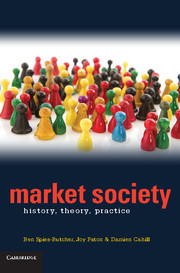1 - Introducing market society
Published online by Cambridge University Press: 05 June 2012
Summary
MUCH OF OUR everyday life revolves around markets. This is because markets are central to the way contemporary society organises the production and distribution of goods and services. Our work comes through a labour market. We find our accommodation through a housing market. Our food, clothes and entertainment are largely purchased in markets. Even markets we have little direct knowledge or experience of can have a profound impact, as became evident in 2007 when the subprime mortgage market collapsed. Although many people had never heard of the complex financial markets and instruments associated with the ‘global financial crisis’, its implications were immense. People lost jobs and homes, and rumours emerged that whole national economies might collapse because of the severe disruption to the market processes at the heart of the economy.
Markets are clearly important to the economy, but they are only part of what is in fact a complex institutional system. Governments also play a central role in the economy. Despite decades of economic restructuring purportedly aimed at reducing state activity in the economy, governments continue to establish and regulate markets. They provide services, redistribute income and are directly involved in production. Other institutions are also central. Much trade and most production do not take place directly in markets but within and between firms, particularly large corporations. While corporations operate within markets, their size and structure give them considerable power to shape both their internal production process and their external environment.
- Type
- Chapter
- Information
- Market SocietyHistory, Theory, Practice, pp. 1 - 16Publisher: Cambridge University PressPrint publication year: 2012



